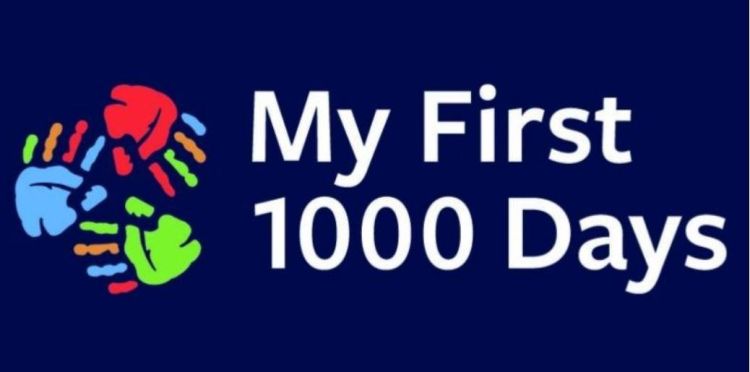Leeds launches landmark early years research project

Improving the life chances of children in Leeds during their first 1,000 days is the focus of an ambitious new research project by the University of Leeds.
My First 1000 Days, which launches today, aims to have significant positive impacts on the health and long-term outcomes of children and their families in Leeds.
Made possible by a generous philanthropic donation, the three-year project is developing a systematic and in-depth understanding of acceptable, feasible and sustainable strategies for integrating a centring-based group care model into health systems in Leeds.
This model was pioneered by the Netherlands Organisation for Applied Scientific Research (TNO), which has partnered with the University of Leeds to develop and adapt it to meet the needs of the local population.
The initiative will boost the life chances of socio-economically disadvantaged children as well as significantly reducing long term costs to the NHS.
Giving the keynote address at the launch event at Nexus, the University’s innovation hub, was Anne Longfield CBE, Chair of the Commission on Young Lives.
She said: “This innovative project has a shared goal of giving children the best start in their lives. It is imperative that we look at the earliest opportunities to help children and families.
“I am really excited to see the outcomes for this systematic project, which has the potential to provide vital learning that can be replicated across communities and influence long-term change for children and families.”
Professor Nick Plant, Deputy Vice-Chancellor: Research and Innovation, said: “My First 1000 Days is a world-leading research project which focuses on improving health and social outcomes for parents and children during their first 1,000 days.
“The project is part of our wider long-term vision to work to improve children’s lives through the delivery of a sustainable programme of transformative research focusing on children’s health and social care. The initiative will boost the life chances of socio-economically disadvantaged children as well as significantly reducing long-term costs to the NHS.”
Cllr Salma Arif, Cabinet Member for Adult Social Care, Public Health and Active Lifestyles at Leeds City Council, said: “As a Child-Friendly City, Leeds City Council make reducing health inequalities for our children and young people a priority. It was a pleasure to speak at the launch event of My First 1000 Days to help continue improving the lives of children and families in Leeds.
“We are really excited to be working with the University of Leeds on the project and are looking forward to sharing how we can have a significant positive impact in the local community.”
Alternative approach
The centring-based group care model integrates group care into routine antenatal and postnatal programmes, offering an alternative approach to support the traditional model of one-to-one care between the caregiver and the health worker.
The model has three key components, providing healthcare in the form of health assessments and individual check-ups; group learning and the sharing of experiences; and peer support and community building.
The group care approach builds on taught classes to provide facilitated discussions which value the knowledge and experience of participants and enable them to learn collectively, in dynamic ways that are engaging and foster mutual support.
Experience in the Netherlands shows that care in a group fundamentally changes the experience of pregnancy and caregiving.
It empowers caregivers, improves their understanding and adoption of healthy behaviours, encourages self-care and provides a rich network of relationships and social support which benefit themselves and their children.
There is some evidence that people receiving group prenatal care have fewer early births, better mental health outcomes and fewer low birthweight babies. The Leeds model will initially focus on children aged 0 to two years old and their families.
The evidence of these benefits is particularly strong among marginalised or under-served populations. The model has also been shown to re-energise clinicians and provide savings to the healthcare system. Though adopted elsewhere, it has never been rigorously evaluated in the UK.
Improving outcomes
My First 1000 Days has three key component areas:
- Physical Activity in the Early Years is led by Dr Camilla Nykjaer in the School of Biomedical Sciences
- Early Language and Cognitive Development is led by Leeds Child Development Unit lead Professor Cat Davies in the School of Languages, Cultures and Societies and Professor Amanda Waterman in the School of Psychology
- Food and Nutrition is led by Professor Janet Cade in the School of Food Science and Nutrition and Professor Marion Hetherington in the School of Psychology.
These areas are all underpinned by the theme of Co-Producing a Disability-Inclusive Model of Group Care, which is led by Professor Angharad Beckett, from Leeds’ Centre for Disability Studies.
The project leadership team includes Professor Jason Halford (Project Principal Investigator and Head of the School of Psychology), Linda McGowan (Deputy Project Principal Investigator and Professor of Applied Health Research in the School of Healthcare), and Dr Shirley-Anne Paul (Senior Project Manager in the School of Psychology).
Professor Halford said: “It is exciting to be working with the city council and key stakeholders in Leeds to produce an intervention with the potential to improve outcomes for children and their families in the city region.”
The long-term vision of the project is to influence UK policy, providing guidance for both caregivers and healthcare professionals that will ensure the best possible start for children in their early years. This will not simply benefit them as children but will have a ripple effect on the rest of their lives, with positive societal implications for the health of the nation and the strength of the economy.
Further information
For media enquiries, email University of Leeds press officer Lauren Ballinger via l.ballinger@leeds.ac.uk.




